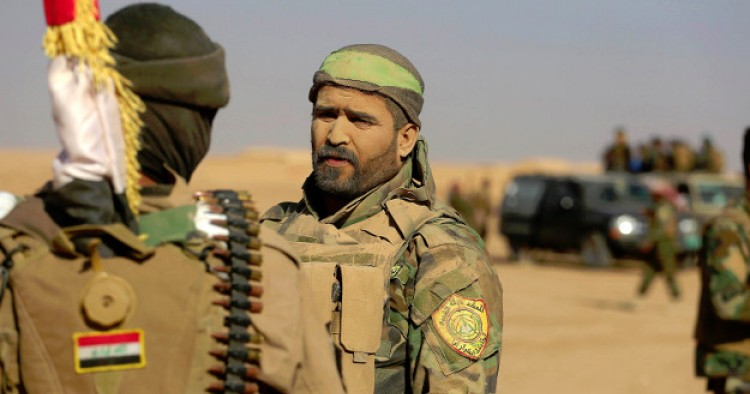A prominent Iran-backed Iraqi militia commander has accused the United States of providing weapons and food to Islamic State fighters trapped in western Mosul, according to Fars News Agency, an Iranian outlet affiliated with the Islamic Revolution Guards Corps (I.R.G.C.). Jawad al-Talibawi, a spokesman for the armed wing of Asaib Ahl al-Haq, said Wednesday that the U.S. planes air drops aid packages to terrorists in Tal Afar, a strategic city 40 miles west of Mosul still under the control of the Islamic State.
Last month, Talibawi had also claimed American special forces called “Delta” had airlifted several prominent Islamic State commanders from western Mosul. He alleged that Islamic State Leader Abu Bakr al-Baghdadi might have been among those rescued.
Comment: With the Islamic State’s control of the Iraqi territory reduced to only seven percent – down from about 40 percent three years ago – Iraqi militia groups controlled by Iran have already shifted attention to Iraqi rivals and American military forces advising and assisting the Iraqi security forces in Mosul and across the country. In the past one month, the I.R.G.C. and its Iraqi proxies have significantly dialed up its propaganda campaign against the U.S. and its regional allies.
“Abu Bakr al-Baghdadi is a protégé of America. His actions and movements are supervised by this country’s [U.S.] intelligence service,” said Ali al-Husseini, a spokesman of Iraq’s Popular Mobilization Force (P.M.F.) in an exclusive interview with I.R.G.C.-affiliated Tasnim News Agency in March. “Al-Baghdadi is an American puppet, and this is undeniable. I believe Americans know where he is but they hide him,” he continued. The militia leader further alleged that American forces in Iraq were trying to transfer Islamic State fighters from Iraq to Syria and Libya.
Akram al-Kaabi, the chief commander of Harakat al-Nujaba, an Iraqi group that fights under the leadership of I.R.G.C. Quds Force Qassem Soleimani in both in Iraq and Syria, also threatened on March 11 that his forces would not allow American forces to take credit for victories against the Islamic State in Iraq.
The Iran-linked groups have also begun to push the Baghdad government to oppose the deployment of additional American troops to Iraq and expel U.S. military advisers from western Mosul. The recent escalation in anti-American propaganda shows that the I.R.G.C. and its proxies are redirecting their attention toward undermining the U.S. interests in Iraq as the Islamic State – the common enemy of Tehran and Washington at present – is on the verge of defeat. Tehran may also be signaling to the Trump administration that it will retaliate through its regional proxies if Washington pursued a more aggressive policy vis-à-vis Tehran.
The P.M.F.’s increasing role in western Mosul, particularly in Tal Afar, has been a matter of concern for Iraqi Sunnis and regional Sunni leaders, who have repeatedly expressed the worry that Iran-backed sectarian groups may engage in revenge killings against Tal Afar’s Sunni inhabitants once the Islamic State is ousted. While some P.M.F. units are Iraqi nationalists and follow Iraq’s top cleric Grand Ayatollah Ali Sistani, what makes Iraqi Sunnis and regional Sunni states particularly worried is that, despite P.M.F.’s diversity, it is the Iran-backed militia units that are playing a leading role in western Mosul.
Asaib Ahl al-Haq is an Iranian-controlled group within the Iraqi Popular Mobilization Forces (P.M.F.). In addition to Iraq, the group also fights under the leadership of Iranian Quds Force in Syria and has close operational links with Hezbollah that dates back to 2005. The group has been implicated in several attacks against American forces, primarily during the surge period, and has been accused of sectarian crimes against Iraqi Sunnis.
The Middle East Institute (MEI) is an independent, non-partisan, non-for-profit, educational organization. It does not engage in advocacy and its scholars’ opinions are their own. MEI welcomes financial donations, but retains sole editorial control over its work and its publications reflect only the authors’ views. For a listing of MEI donors, please click here.













